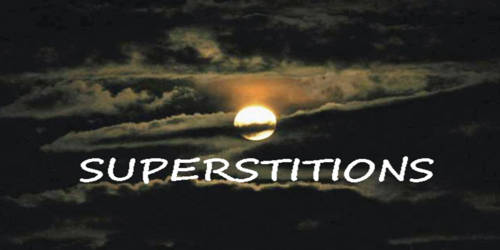Superstition
Superstition “is a belief, half-belief, or practice for which there appears to be no rational substance.” A blind belief in augury, magic, omens hearsay, the baseless thing, illogical manners is superstition. It finds a fertile soil and breeding ground in human ignorance and a lack of scientific knowledge. People tend to believe that they have their own certain knowledge or evidence that supports religious beliefs or philosophical reasoning. Many people may believe that faith is also a form of superstition.
In today’s world, people still believe in omens and auguries. The earliest men who had no scientific knowledge fell on easy prey to superstition. Even in the age of rapid advancement of science and technology, they are afraid like their forefathers living in the caves and connect their misfortunes with mysterious and unknown forces. This leads people into believing that they have more control than the reality and actuality of all situations and circumstances. Such a state of mind always gives rise to various types of superstitions. Though, those who chose to believe, find their world delivering what they expect.
A superstition is an irrational fear of what is unknown or mysterious, especially in connection with religion. Animals and human sacrifices to appease the unknown black forces reflect man’s intellectual bankruptcy, primitiveness, and ignorance. It’s interesting to notice that almost everybody is fairly superstitious, but the life of a true superstitious person becomes a never-ending fight against a sober view of things. Man is still afraid, awed, and hunted by the fear of the unknown inexplicable trouble and suffering through the offerings to the ghosts.
All superstitions have their origin in human psychology of fear of ill-luck, insecurity and the dread of inexplicable forces in nature. When some phenomena cannot be made out or explained, people start dreading them and assign them supernatural, divine and mysterious origins. Tantriks, priests godmen, babas, other vested interests also help in spreading superstitions. In superstition, the astrologers, priests, stargazers, magicians, god-men, quacks and babas have a very good business.
It’s important to mention that every superstition has its own origin and history. To know the lucky and auspicious days we consult with the astrologers, palmists, priests, and god-men. Faith is a positive factor whereas superstition is a negative factor. Being well advised by them we start a new project, journey, and business. The superstition insists that it’s bad luck to walk under a ladder that came from the early Christian belief that a leaning ladder formed a triangle with the wall and ground. It was believed that these ghosts operated at night and that they were visible to some people and invisible to others. Likewise, the date and time of marriage, inauguration, the foundation of anything, filling in nomination papers are fixed, determined and communicated in accordance with the suggestion and advice of the astrologers and the positions of the planets and stars. Unfortunately, even at present, such clever men are at work.
All superstitions have common origins. There are many kinds of superstitions that are observed by common people. Superstitions are thriving on a large scale under the auspices of various cults, religious sects, good men and priests. They prevail in every society, nation, and community. In a superstitious atmosphere, for thence telling becomes a bumper business. Astrologers, Sooth Sayers, good men, and priests have a great demand not only to the illiterate, poor and the ignorant but also to the rich, well-off, highly educated people, leaders, and eminent politicians. We should try to develop a scientific spirit of mind and judge everything on the basis of reason. This is the age of reason, science, and technology, yet many primitive superstitions continue endlessly.
















